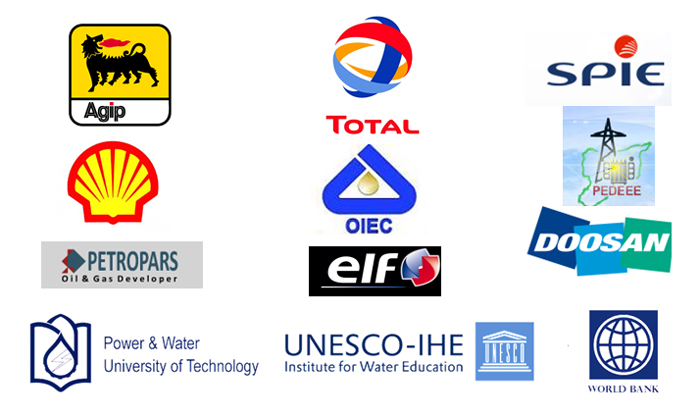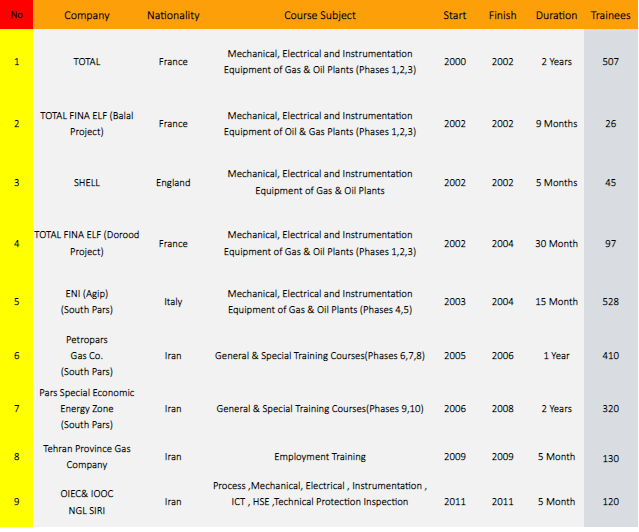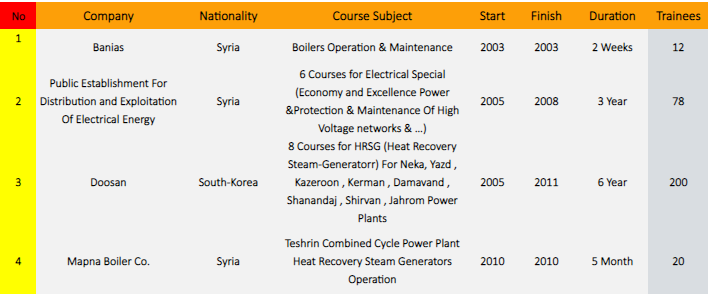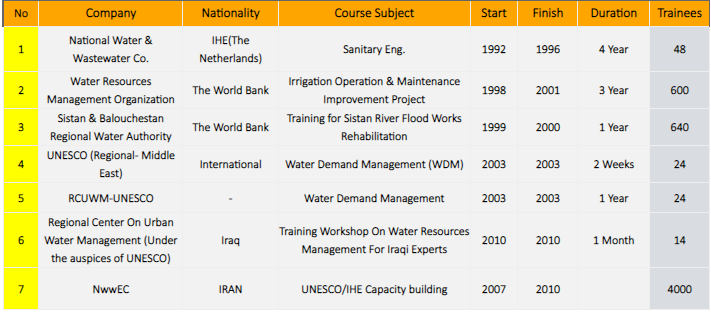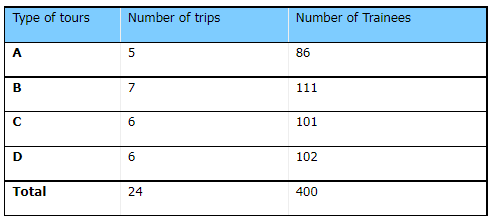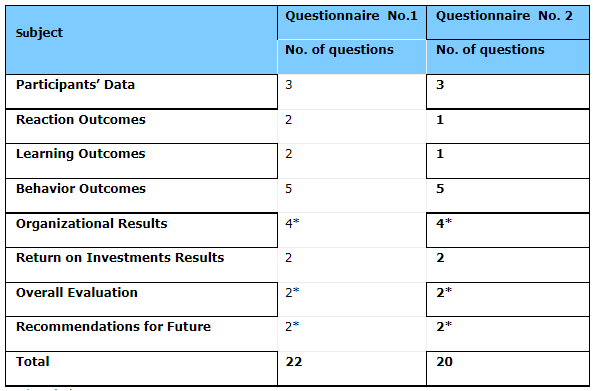Many local and foreign contractors in the mentioned industries have also a history of cooperation with university. The table below shows some selected companies. (UNESCO, IHE, TOTAL, SHELL, Elf, ENI, AGIP, BANIAS, PEDEEE, DOOSAN and the World Bank) and about three hundreds organizations (except for power and water industry and energy sector) have cooperated with professional training center.
Table of International Collaboration:
Some Selected PTC International Training Courses in oil ,gas and petroleum

Some Selected PCT International Training Courses power Plant
Some Selected PCT International water and waste water
1.1. Training and Capacity Building for Water and Wastewater Sector, Financed by World Bank
1.1.1. Preface
Training and Capacity Building for national water and wastewater sector was financed by World Bank, and was carried out during years of 2008 to 2009. As this project has a lot of similarity with the present project of training and capacity building for national water and wastewater sector financing by Islamic Development Bank, we intend to describe previous project widely and individually in comparison with our other relevant assignments, in order to perform a comprehensive outlook of this project and depict its benefits and challenges in this regard. We also include the post Evaluation report of World Bank Project; hence not only it could be valuable to evaluate our J.V. for this project but also its outcomes and Lesson-Learnt facts might be benefitted in whole overview of the project.
1.1.2. Introduction
National water and wastewater Engineering Company (NWWEC) received a loan with the amount of 650 million dollars from World Bank, for achieving development goals in Iran’s Water and Wastewater Sector. Since one of the most important aims of World Bank in granting such loans to the beneficiaries is quality improvements of human resources in that special sector, Capacity Building and training of experts and professionals in water and wastewater sector was defined as a component of this loan. Accordingly, a bid process was held byBureau of procurement of funds and development of non-governmental participation, as the executing agent of NWWEC, and UNESCO-IHE and PWUT J.V. was awarded the contract.
Execution of this project was commenced in January 2009 and was carried out during a period of 2 years. Holding 105 courses within Iran and 24 international study tours, in conjunction with 3 workshops, about 4000 experts and professionals of water and wastewater industry has been trained and a remarkable collection of professional documents have been gathered together.
1.1.3. Short Profile of Project
During this project, 64 title of tailor-made courses as well as 105 courses for 3500personnel of water and wastewater companies have been performed and 105.000 hour of class education have been held. Additionally, 400 Water and Wastewater experts have travelled to five European countries for study tours and 30 European companies have been visited. Three workshops about strategic planning of WW industry also have been held in this regard. The number of teaching days by international and local teachers were 316 and 219 days respectively, and 111 travels of foreign lecturers have been recorded. What is more, 20.000 Power Point slides and educational contents have been translated during execution of project.
1.1.4. Execution Procedure of Project
1.1.4.1. Connection between different parts of Training and Capacity Building
One of the most important concepts which should be considered in present project is the connection between diverse compartments of the planning procedure of courses. Accordingly, a unique process for planning the content of training courses has been prepared which is depicted in Figure 27.
1.1.4.2. Determination of main components of project and planning of courses
In order to appropriate planning of the project, several meetings have been held with key experts and also professional staff of water and wastewater engineering company to specify training requirement and then, the syllabus of courses were finalized accordingly. Furthermore, a couple of water and wastewater treatment plant and installations were been visited by key experts of UNESCO-IHE to become more familiar with the current situation of Water and Wastewater industry in Iran.
The first workshop for planning of courses has been implemented for decision making on the method of syllabus’ designing and performing the courses. Besides, first thematic workshop entitled “Institutional Arrangements” has been implemented in February 2008 by two international lecturers, for more than 100 water and wastewater managers from all over the country.
Based on need assessments carried out through abovementioned process, achieving the concepts presented in Figure 28 was considered and consequently, training courses were classified into four categories shown in Figure 29.
1.1.5. Implementation of the Courses and Workshops
Training courses initiated on 14 June 2008 and 3500 trainees participated in 105 diverse courses. Benefitting from Video Recording and Question/Answer sessions, the quality of classes and learning process was immensely heightened. All lectures and documents provided by foreign teachers were translated to Persian, simultaneously.
In addition, a Web-based data space was allotted on internet to the project and all educational materials, including articles, power point slides, extra training contents, etc. were uploaded in that website. As a result, trainers were able to reach all these materials, wherever they were. Furthermore, a unique and precious collection of educational resources came together for future application.
Moreover, all syllabus were re-arranged based on the “Integrated training system for employees of Ministry of Energy” and hence, an official certificate approved by Presidential Deputy of Strategic Planning, as well as official international certificate issued by UNESCO-IHE, were granted to the participants.
Thematic workshop no. 2 also implemented in April 2009 and as a result of this workshop, the companies which host the study tours got familiar with challenges and issues of WW industry in Iran. By holding several meetings and visits of WW facilities, planning of study tours were also finalized.
1.1.6. Study tours
According to need assessment carried out in advance, study tours were categorized in four major titles as follows:
1. Type A: Sewer systems for small and individual communities,
2. Type B: Advanced wastewater treatment technics,
3. Type C: Improvement of water and wastewater treatment operation,
4. Type D: General and financial management improvement.
There were a precise evaluation of European companies based on Iran’s requirements in water and wastewater sector and finally, a number of companies from Netherlands, Germany, France, Belgium and Luxembourg were selected among a wide variety of companies.
A specific brochure for each trip were prepared, depend on the characteristics of each study tours, and two coordination meetings for each trip were held with trainees and participants in order to better organization of the trip and maximizing the efficiency of tours.
The trainees participated in study tours were requested to write a comprehensive Trip Report, and a precious collection of field experience in water and wastewater area was gathered together by performing such reports. Furthermore, useful tips and experiences from each report were selected and published as a book that could be evaluated as an astonishing outcome of these tours.
A brief statistic of whole study tours is presented in Table 20.
|
Table 20: summary of study tours’ statistics
On the other hand, managers of European companies which their companies were visited by Iranian experts, were invited to Iran to become familiar with potentials of water and wastewater industry in Iran.
1.1.7. Addendum to the Contract
After completing the required services indicated in the initial Contract, the World Bank issued its No-objection to extend the project without holding a new bid, to the UNESCO-IHE-PWUT J.V. for the amount equal to 66% of initial contract price. This addendum were became executive by NWWEC (the Employer) through a Minute of Meeting, in which stated that the extension of the Contract was granted to aforementioned J.V.
1.1.8. Conclusion
1.1.8.1. Evaluation of courses/study tours
A. Introduction
In addition to the end-of course/study tour evaluations, a survey for summative evaluation of the entire Training and Capacity Building (TCB) project was conducted at its final stage. The specific objectives were:
-Achieve an overall evaluation on effectiveness of the project
-Identification of strengths and weakness points of the project
-Determine lessons learnt from the project
-Benefit from this experience for future projects/programs
Furthermore, the survey was meant for triggering post-evaluation of the TCB project at the Water and Wastewater Companies (WWCs) level so that its results were used as an input for conduction of discussions at the final workshop in a structured and conclusive way.
Brief descriptions of methodology, results of the survey and concluding remarks regarding post-evaluation of the training courses and the study tours are given in the following sections.
B. Methodology
In accordance with the international references, two questioners were designed for the post- training evaluation at five levels. The first questioner was customized for evaluation of the courses and the second one was devoted to assessment of the study tours. The initial questioners were reviewed and discussed with a focused group of the project coordinators and managers of training departments from the WWCs. Then after, edited versions of the questionnaires were pre-tested with about 50 NWWEC staff who had participated in at least one training course. On this basis, the questionnaires were finalized.
Both questionnaires were officially sent out to the 30 Rural as well as 34 Urban WWCs through intranet system of the NWWEC. These questioners were enclosed with a cover letter, an instruction sheet and a Microsoft Excel spread sheet for compilation of the data. As instructed, managers of the training departments of WWCs, randomly distributed the questionnaire No.1 only among 30% of the courses trainees and questionnaire No. 2 only among 50% of the study tours participants so that meaningful results could be acquired within a short time period. They further collected the filled questionnaires, compiled the data and sent back the overall results of their companies. These were further combined and analyzed at the NWWEC to achieve the overall country level results which are described in this section.
Contents of Questionnaires:
Table 21 depicts an overall view of the questionnaires. The questionnaires basically had the same structure in which similar questions for evaluating the outcomes of the training courses and the study tours were classified in distinct sections. The questions, except for three open ones, were of multiple-choice type in which respondents were asked to express their level of agreements mostly on a quantitative scale. Weighted averages of this data were calculated afterwards and were expressed on a 0-100 scale to ease their comprehension. Based on this data, combined at the country level, the final evaluation results and their analysis are summarized below.
Table 21: Overall view of the Questionnaires
* Includes one open question
C. Results & Outcomes
Considering time limitations, 26 Urban WWCs and 25 Rural WWCs sent back their overall results by the deadline prior to convention of the final workshop. These companies comprised about 80% of the total number of WWCs (64) and thus the survey covers a good representation of the entire sector. Distribution of the respondents among the WWCs is given in Table 22. A comparison of the total number of respondents (470) with the total number of individual trainees of the TCB project (about 3000), shows that about 15% of the participants found the chance to express their views in the current survey. This figure can be acceptable for the present study considering its objectives and time limitation.
Table 22: Distribution of respondents among the Water and Wastewater Companies

In accordance with the five levels approach for evaluation of training programs, the main results and outcomes of the present survey are summarized in the corresponding sections below.
D. Reaction Outcomes
Reaction outcomes are measures of the trainee’s perceptions, emotions, and subjective evaluations of the training experience. For this purpose, the end-of course/study tour evaluations had provided detailed results on the individual events which served as a formative feed-back for improvement of the TCB project at the time. In the present survey, respondents expressed their overall view about the entire package of the training courses or the study tours.
Figure 35 depicts results of the trainee’s satisfaction level with the training courses, provided for different themes, in enhancing their level of knowledge and skills. These results match well with the role of the companies of respondents which is a utility provider and not a consultant or construction engineering company. The relatively low score for the financial management theme can perhaps be linked to differences of the local financial system with that of Europe.
